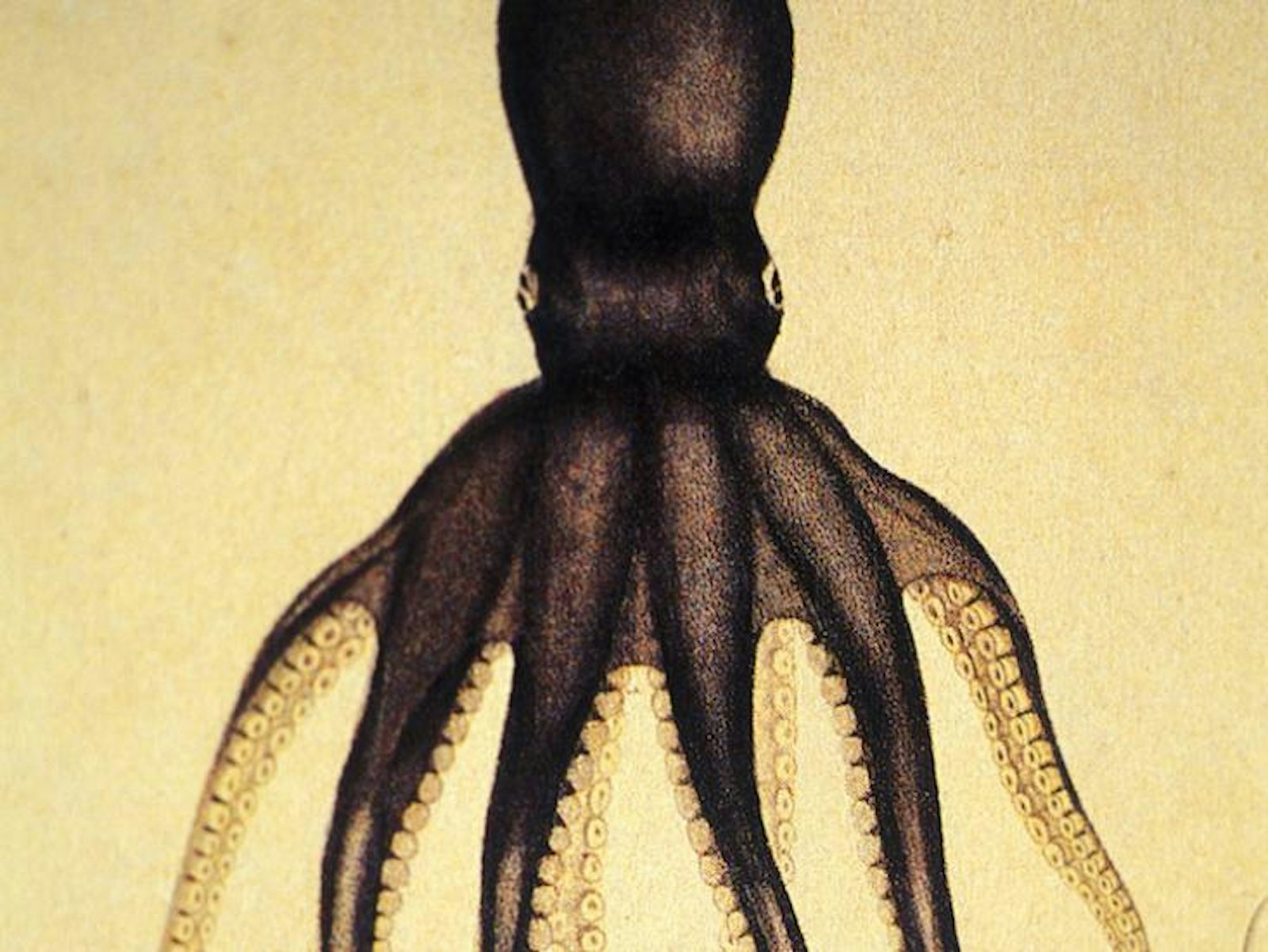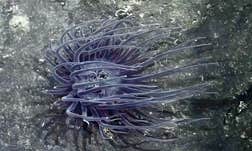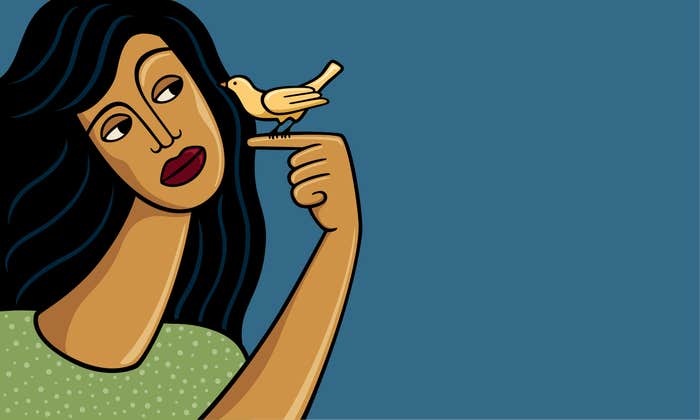On a recent Sunday, at my local Italian market, I considered the octopus. To eat the tentacle would be, in a way, like eating a brain—the eight arms of an octopus contain two-thirds of its half billion neurons. Delicious for some, yes—but for others, a jumping off point for the philosophical question of other minds.
“I do think it feels like something to be an octopus,” says Peter Godfrey-Smith, a professor of philosophy at CUNY Graduate Center, who has spent almost a decade considering the idea. Stories of octopuses’ remarkable ability to solve puzzles, open bottles, and interact with aquarium caretakers, suggest an affinity between their intelligence and our own. He wonders: What, if anything, is going on in its head—or as may be the case, its arms? The rest of its neurons are contained in lobes wrapping around its esophagus and sitting behind its eyes. This alien-like physiology is the result of almost 600 million years of evolution that separate us.
Since a 2008 dive off the coast of Sydney, Australia, where Godfrey-Smith encountered curious, 3-foot long cuttlefish, he’s been fascinated by the minds of cephalopods, which have the largest nervous systems of all the invertebrates. He’s teamed up with scientists to uncover their secret lives and behaviors, publishing in scientific journals and also a blog, where you can follow his adventures with posts that blend “natural history and philosophy.” He has a book coming out at the end of the year called Other Minds, which digs into how the octopus helps us understand the evolution of subjective experience. “I think cephalopods have a special kind of otherness, because they are organized so differently from us and diverged evolutionarily from our line so long ago,” he says. “If they do have minds, theirs are the most other minds of all.”
Nautilus recently caught up with the philosopher by Skype to ask what it’s like to be an octopus.
Does an octopus have a sense of self?
Well they are a tricky case. They might have quite a different self from other animals, because they have this nervous system spread through the whole body. There is quite a bit of work suggesting that each arm of an octopus has some degree of autonomy. For example, each arm can probably do its own sort of local exploration. And each arm has its own senses, and can taste everything it touches. So, octopuses are a bit of a special case because they might be a somewhat different kind of unit from an animal like us, where the whole body is involved in the cognitive side of what they do, not just the brain.
Is the act of exploring pleasurable to an octopus?
Octopuses and cuttlefish exhibit curiosity more than other invertebrates. Curiosity is a rich word to use, but people who work on them find it hard not to use the word. They do seem to be genuinely interested in what people are up to. They don’t just sit there and go about their business. They act as if they have a kind of curious engagement with people. Octopuses also have individual recognition. There is a nice experiment a few years ago that showed octopuses could recognize individual people. The experimenters tested whether octopuses could be consistently friendly to some and friendly to other humans even wearing the same clothes. They dressed people up in the same exact outfits, but the octopuses could still distinguish between people they liked and didn’t like.
How do they learn?
They seem to learn by trial and error, or learning how to act by tracking what works and what doesn’t work. This is more sophisticated than classical conditioning, the sort of learning seen in Pavlov’s dog, a kind of learning that’s more widespread in animals—correlations between events. That’s not learning by trial and error because you’re just learning that x tends to follow y; you’re not learning whether x is good or bad, or whether your action is good or bad.
In her recent book, The Soul of an Octopus, Sy Montgomery describes forming friendships with some octopuses. Do you think octopuses feel affection or even camaraderie?
I think those feelings are perhaps too sophisticated. But as she says in the book, octopuses can remember individual people, and they do have positive or negative ongoing attitudes to people. So they might like you and not like me. Now that could be quite a simple thing. It might be that the octopus just sees you, recognizes you, and feels okay. Whereas it sees me, recognizes me, and feels stressed. I would still be very cautious about using a term like friendship. I think it’s a hard one.
What do you make of the similarities between our mind and an octopus’s?
When we find similarities of this sort, it suggests that some features of our minds are not as accidental as we might have suspected. Instead, they are to be expected, to some degree, whenever animals evolve large nervous systems. It may be that evolution tends to produce some similar features whenever it builds an animal with a large brain and an active lifestyle. It’s important not to exaggerate this point. We’re not learning that these features would exist in any possible mind, but their presence in these two very different cases is important. You don’t have to have a brain like us to have subjective experience of some kind.
The philosopher Thomas Nagel says other minds are always unknowable. Why do you disagree?
Nagel suggested that, given the way our current science is set up, there’s no way of getting any sort of scientific explanation of subjective experience—of how it feels from the inside to be a bat or an octopus or a person. He holds out the possibility that we might come up with a different kind of scientific theory in the future that could solve the problem. I agree with some of what he says about the difficulties, but I think that it’s not as hard to make progress as he thinks.
I think also that Nagel and others (especially others) have an unrealistic picture of what a scientific theory ought to achieve in this area. A scientific description won’t capture in words how an experience feels from a first-person point of view, but that’s fine. Having an experience will always be different from having a description of what goes on in someone when they have that experience. That will be true whether the universe is entirely physical, whether there are immaterial souls, and so on. Sometimes unreasonable demands are made. But this does not dissolve the problem entirely. We can still ask: Which organisms (and other systems) have subjective experience at all? Do bats have it? Do octopuses? Do some computers? This I think is a genuinely difficult question that will only be fully answered when we have some different bits of scientific theory to work with.
Regan Penaluna is an assistant editor at Nautilus. Follow her on Twitter @ReganJPenaluna.


























